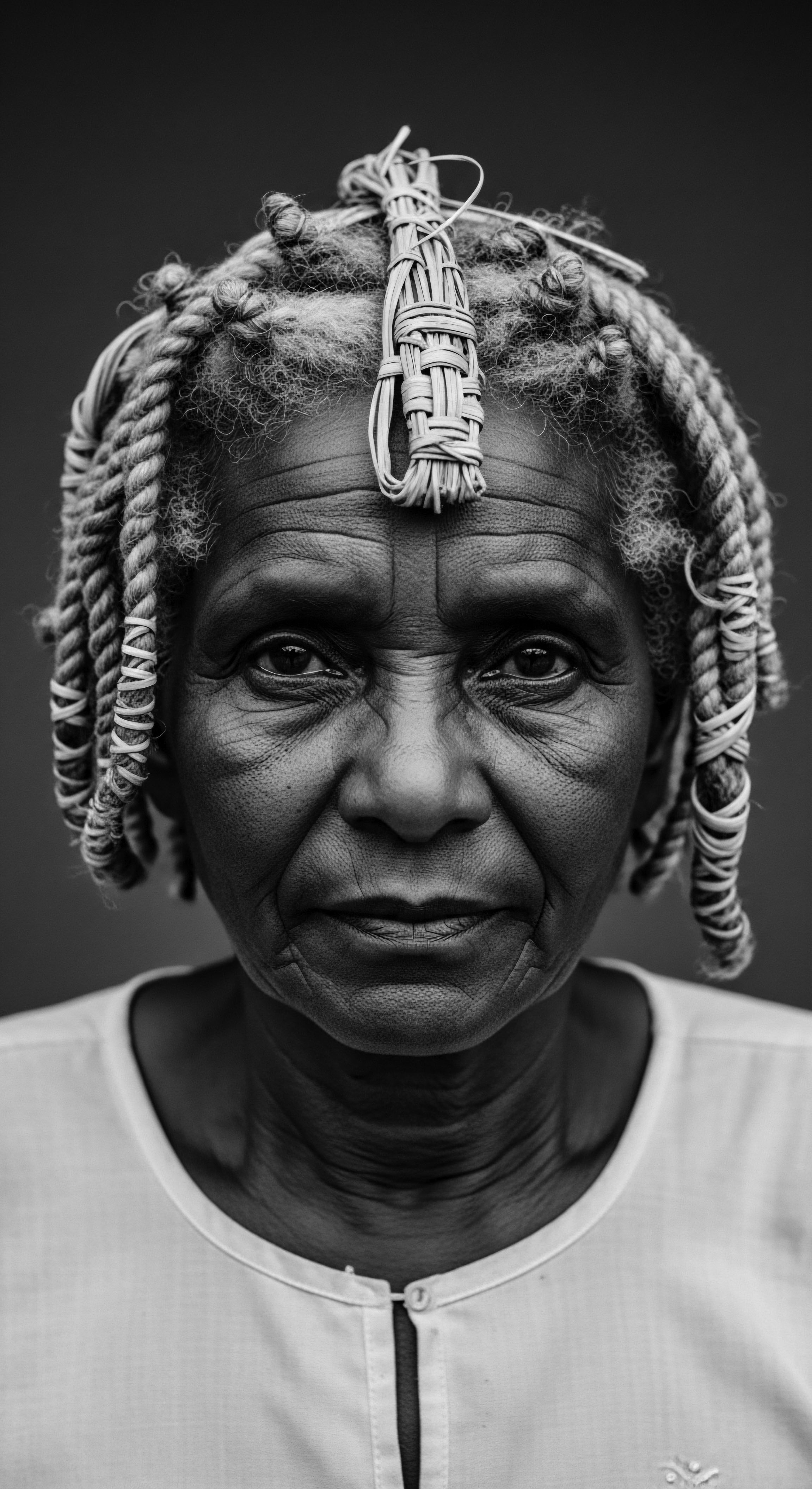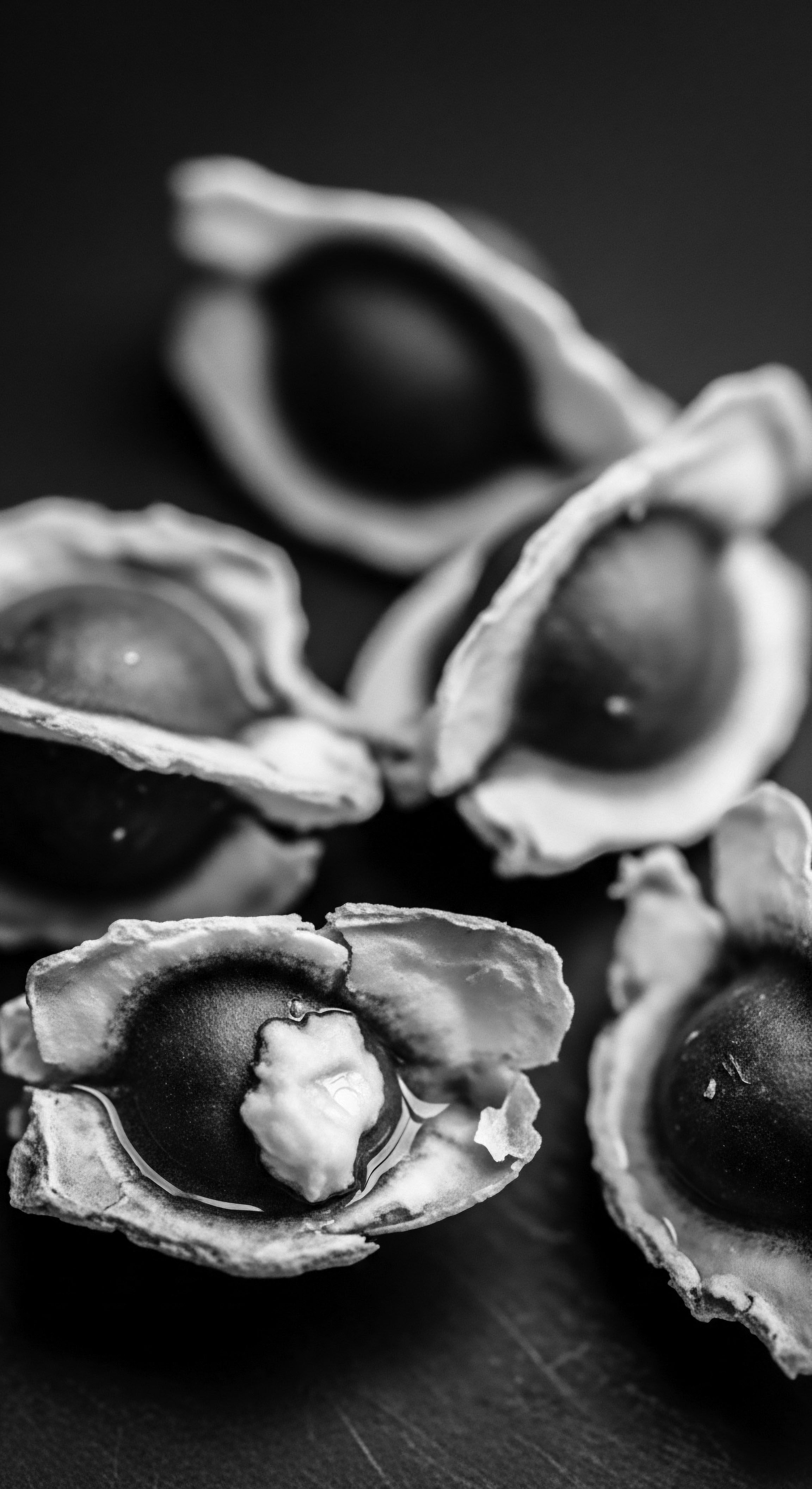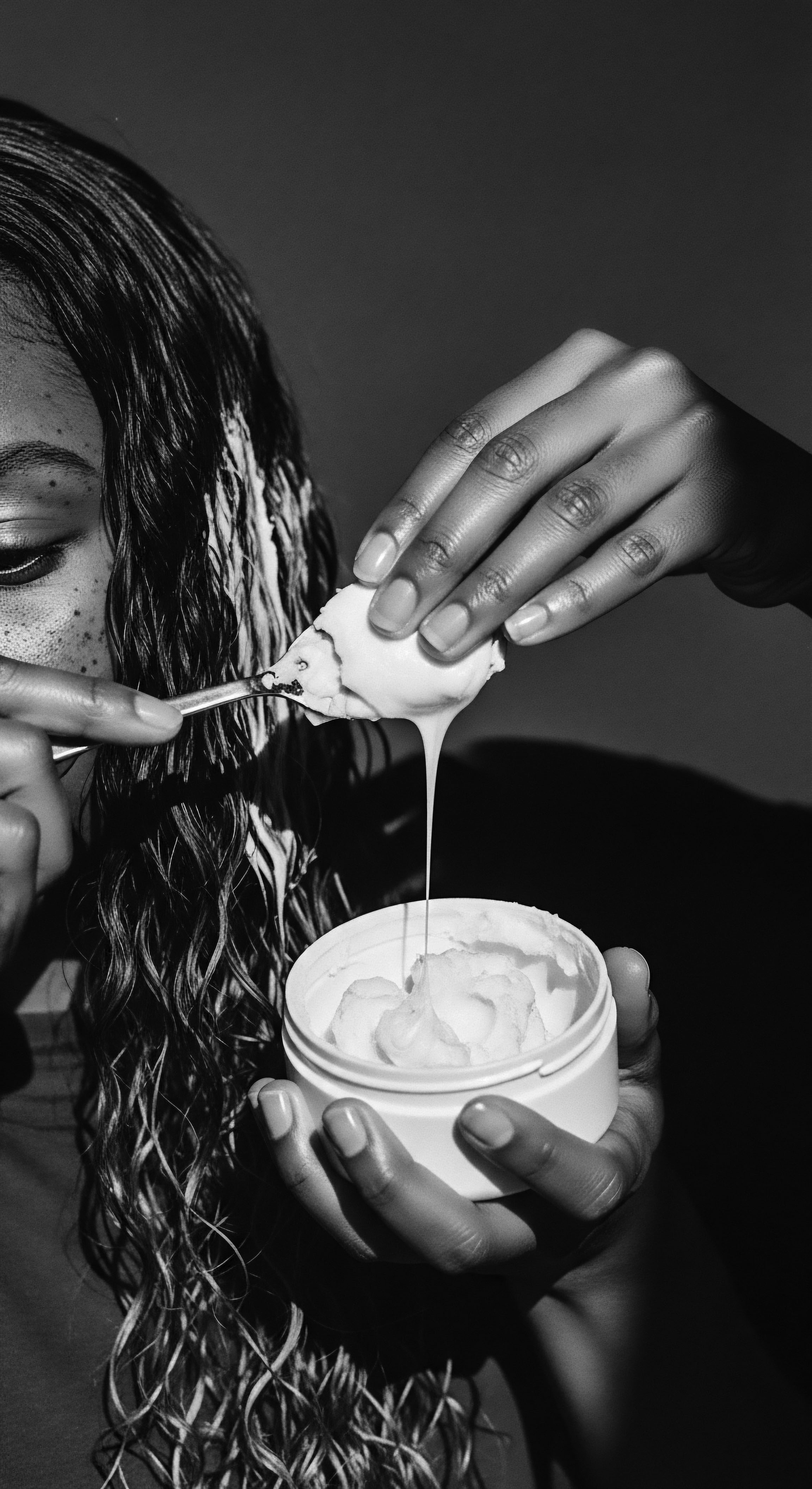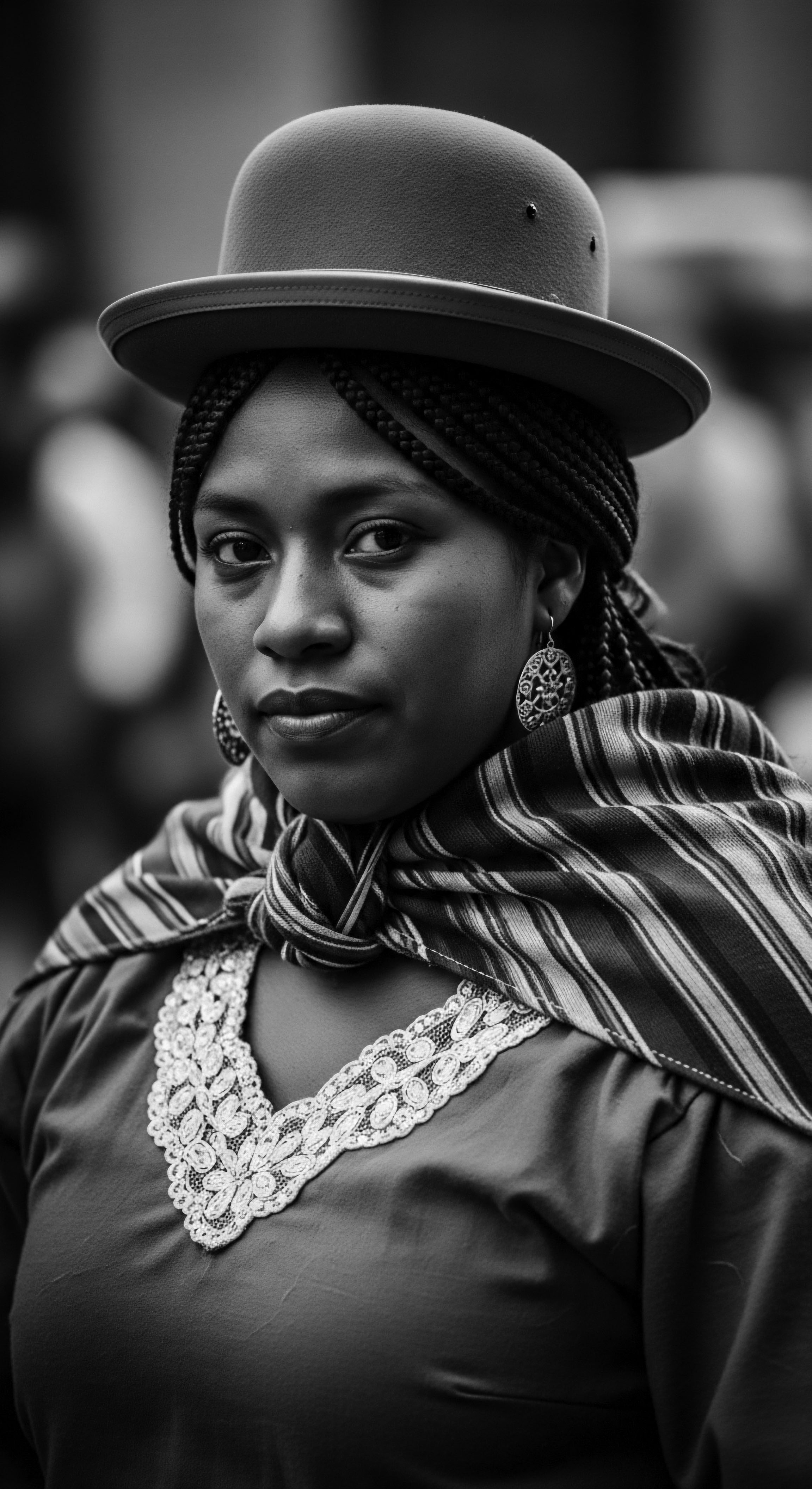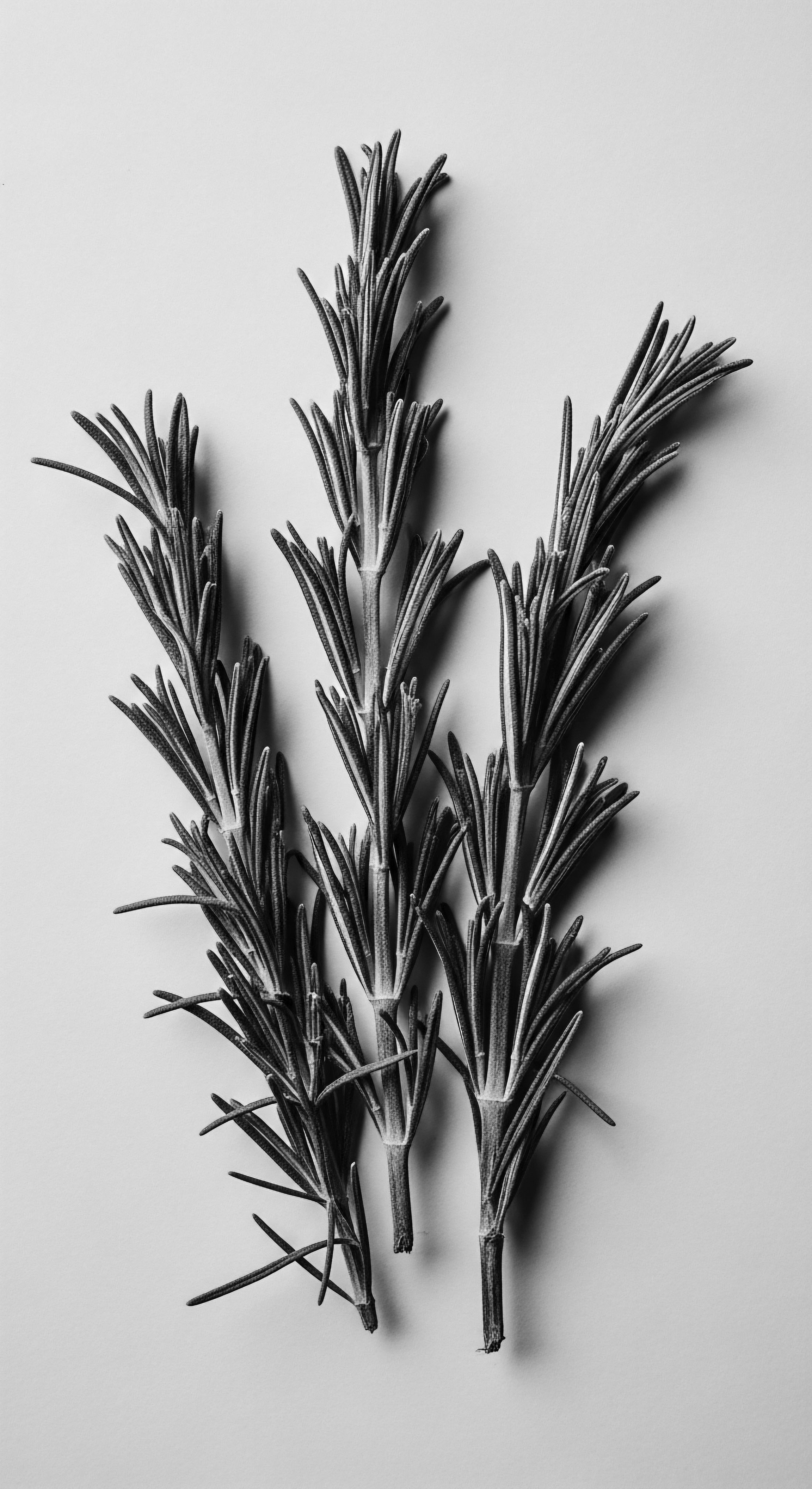
Fundamentals
Within the vibrant tapestry of Roothea’s ‘living library,’ Haitian Black Castor Oil, affectionately known as Lwil Maskriti in Haitian Creole, stands as a foundational entry. This traditional oil, extracted from the seeds of the Ricinus communis plant, holds a distinctive place in the lexicon of textured hair care and ancestral wellness. Its designation signifies not merely a product, but a historical and cultural touchstone, deeply intertwined with the heritage of the Haitian people and the broader African diaspora. The simple designation of ‘Haitian Black Castor Oil’ begins to reveal a story of resilience, ingenuity, and a profound connection to the land.
The elucidation of Haitian Black Castor Oil starts with its elemental source: the castor bean plant, which has been cultivated in Haiti for generations, tracing its origins back to Africa. Unlike its paler, cold-pressed counterparts, the Haitian variety acquires its characteristic dark hue and nutty aroma through a meticulous, age-old preparation method. This traditional approach involves roasting the castor beans, then grinding them into a paste, and simmering this paste in water over a low flame.
The oil, separating from the bean matter, rises to the surface and is carefully skimmed off. This unique artisanal process, passed down through countless generations, is not simply a manufacturing technique; it is a ritual, a continuation of ancestral wisdom that preserves the oil’s potent properties and cultural significance.
Haitian Black Castor Oil is more than a botanical extract; it represents a living lineage of care, deeply rooted in the soil and spirit of Haiti.
The significance of this oil extends far beyond its physical attributes. For many, it embodies a direct link to the practices of forebears, a tangible connection to a past where self-sufficiency and natural remedies were paramount. The communal act of preparing Lwil Maskriti often involved families and communities, transforming a practical task into a shared experience, reinforcing social bonds and transmitting cultural knowledge. This communal aspect is a vital component of its heritage, showcasing how traditional care rituals were interwoven with daily life and collective identity.
Understanding the fundamental aspects of Haitian Black Castor Oil involves recognizing its dual role: a botanical marvel and a cultural artifact. The oil’s inherent composition, rich in ricinoleic acid, omega fatty acids (3, 6, 9), and vitamin E, lends itself to numerous applications. These components contribute to its traditional renown for promoting hair growth, strengthening strands, moisturizing the scalp, and offering soothing properties for various skin and body concerns. Its very presence in Haitian households for centuries underscores its deep utility and the trust placed in its restorative capacities.

Traditional Preparation: A Heritage of Hands-On Care
The artisanal method for producing Haitian Black Castor Oil is a testament to the enduring knowledge held within Haitian communities. This is a process steeped in patience and tradition, differing considerably from industrial methods. The steps are deliberate, each contributing to the oil’s unique profile and its profound cultural resonance.
- Harvesting and Drying ❉ Castor beans are gathered from the plant, then carefully dried under the sun. This initial step removes excess moisture, preparing the beans for the next stages.
- Roasting ❉ The dried beans are roasted. This particular step is what gives Haitian Black Castor Oil its distinctive dark color and nutty aroma. The roasting process is believed to alter the beans’ composition, enhancing the oil’s properties.
- Grinding ❉ Following roasting, the beans are ground into a paste. Traditionally, this was often accomplished using a mortar and pestle, a manual process that connects the oil’s creation to ancient techniques of food and medicine preparation.
- Boiling and Extraction ❉ The paste is then simmered in a large pot with water over a low flame for several hours. This slow cooking allows the oil to separate from the solid bean matter and rise to the surface.
- Skimming and Storage ❉ The oil, now floating on the water’s surface, is carefully skimmed off and collected. It is then stored, often in simple, traditional vessels, ready for its many uses.
This traditional manufacturing process ensures that a maximum of the oil’s beneficial compounds, including omega fatty acids and ricinoleic acid, are retained. The unrefined nature of this oil, filtered simply through screens, preserves its raw vitality, distinguishing it from many commercially processed castor oils.
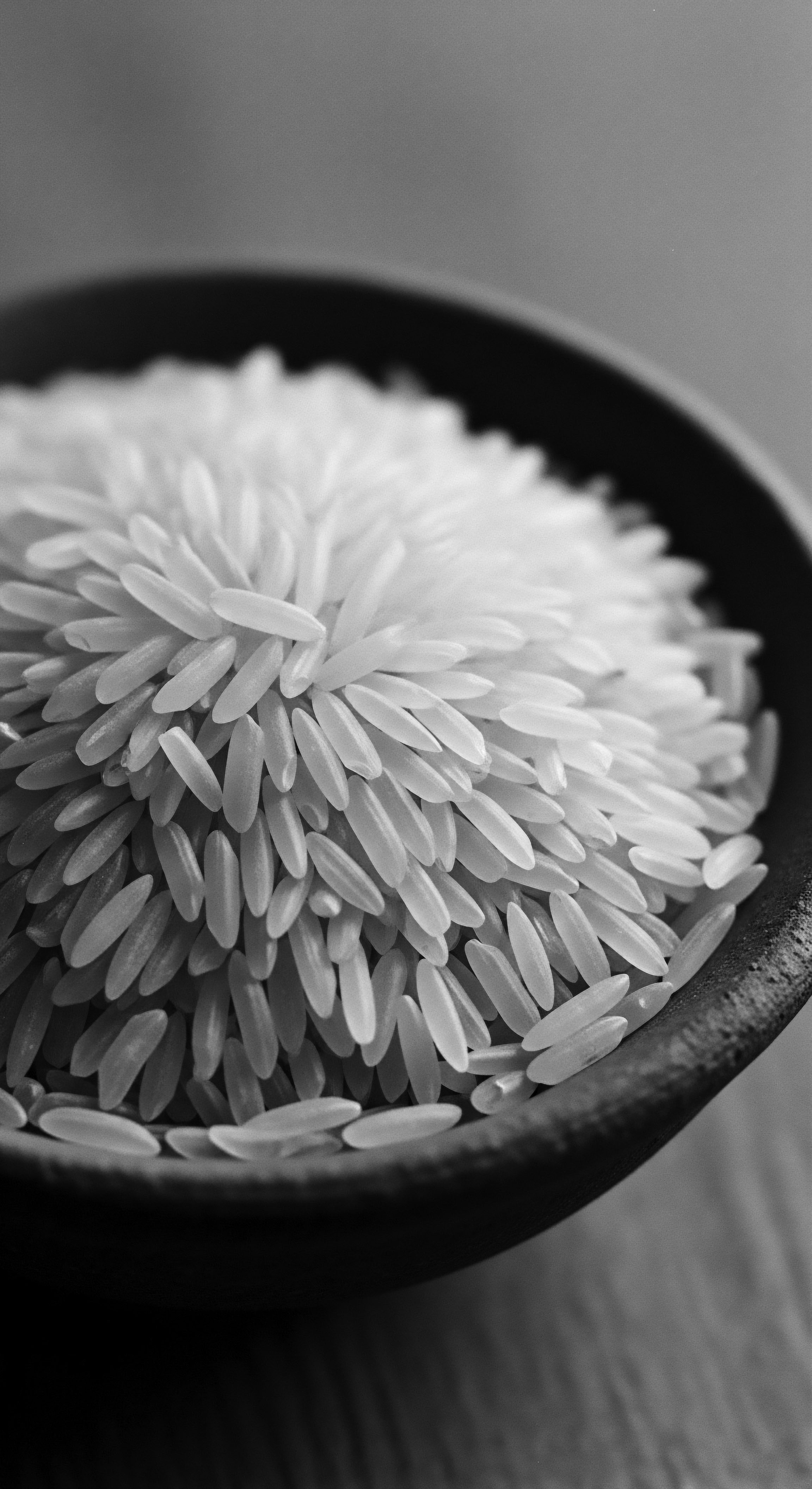
Initial Understandings of Its Benefits for Textured Hair
From the earliest applications, Haitian Black Castor Oil has been revered for its perceived benefits for hair, particularly within the context of textured hair types. Its rich, viscous consistency was intuitively understood to be a potent sealant for moisture, a crucial aspect for coils and curls prone to dryness.
- Moisture Retention ❉ The oil’s thick texture helps to seal in moisture, a vital function for preventing dryness and breakage in naturally coily and curly hair.
- Scalp Nourishment ❉ Regular application was observed to soothe itchy scalps and alleviate dryness, promoting a healthy environment for hair growth.
- Hair Strength ❉ It was applied to strengthen hair strands, reducing susceptibility to breakage and aiding in the appearance of thicker, more resilient hair.
These initial observations, passed down through generations, laid the groundwork for its enduring legacy as a cornerstone of textured hair care, long before modern science began to explain the underlying mechanisms. The communal understanding of its efficacy was born from lived experience and generations of shared knowledge.
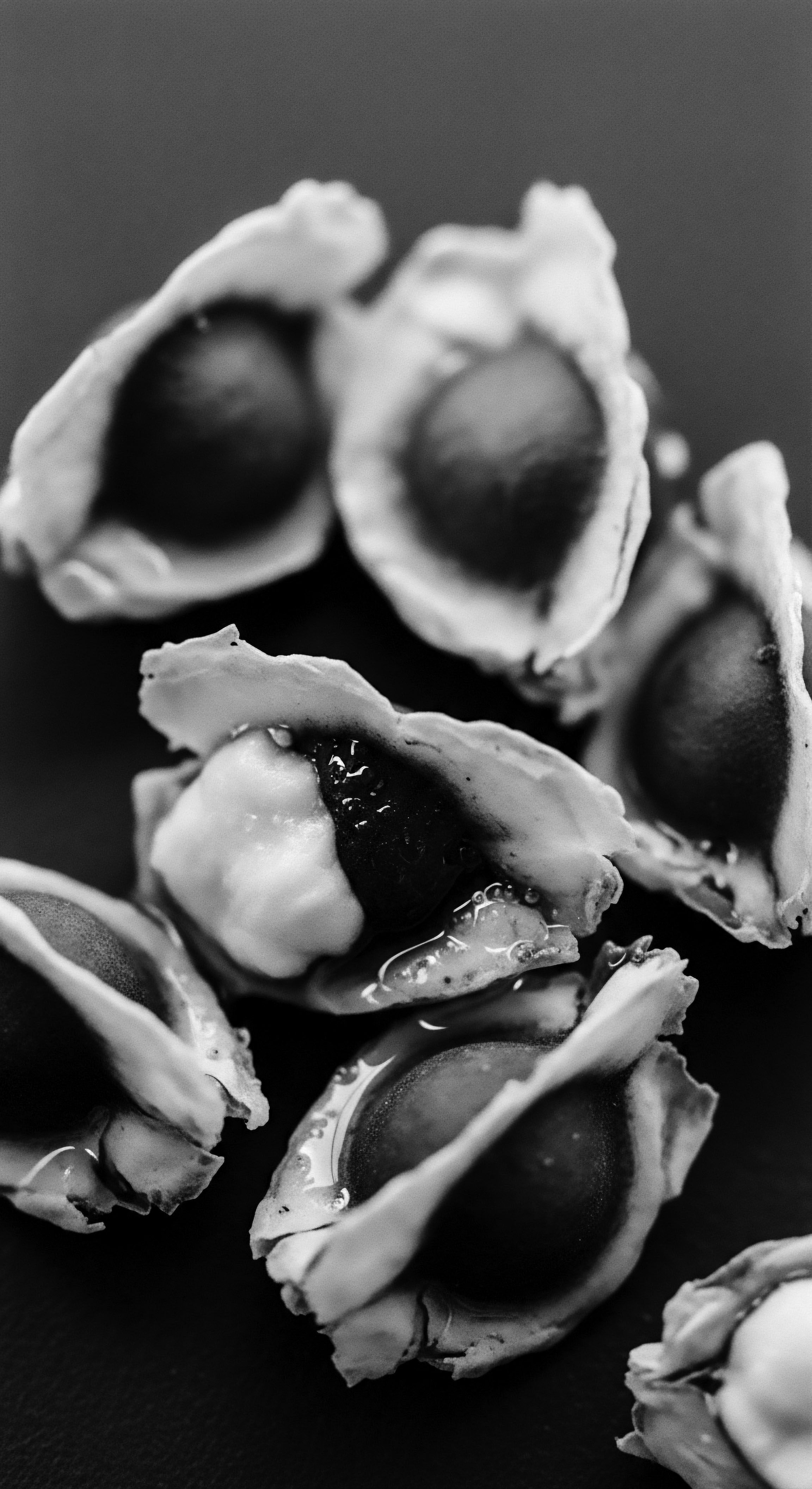
Intermediate
Moving beyond the foundational understanding, the intermediate interpretation of Haitian Black Castor Oil deepens its cultural and scientific delineation. Here, we perceive Lwil Maskriti not merely as a traditional remedy, but as a dynamic element within the ongoing narrative of Black and mixed-race hair experiences, its significance continually affirmed by both ancestral practice and contemporary scientific inquiry. Its very designation carries the weight of a complex history, an ancestral echo in every drop.
The meaning of Haitian Black Castor Oil broadens to encompass its profound implication for self-identity and community solidarity. It symbolizes more than just physical health; it represents a steadfast connection to cultural roots, particularly for those in the diaspora. The oil’s widespread presence in Caribbean households speaks to a shared heritage, a collective memory of traditional self-care and resilience against historical adversities. This communal embrace reinforces its position as a living artifact, a testament to the ingenuity of generations who relied on indigenous resources for well-being.
Lwil Maskriti stands as a silent guardian of heritage, its very existence a defiance against narratives that sought to erase ancestral wisdom.

The Chemical Signature: Ricinoleic Acid and Beyond
From a scientific perspective, the distinct properties of Haitian Black Castor Oil are largely attributed to its unique chemical composition. The predominant fatty acid, ricinoleic acid, constitutes a remarkable 85-95% of its total content. This monounsaturated fatty acid is understood to be the primary agent behind many of the oil’s reputed benefits.
Beyond ricinoleic acid, Lwil Maskriti contains other beneficial compounds that contribute to its overall efficacy. These include:
- Omega-6 and Omega-9 Fatty Acids ❉ These essential fatty acids are crucial for scalp health and hair vitality, nourishing the hair follicles and supporting robust growth.
- Vitamin E ❉ A natural antioxidant, Vitamin E protects the scalp and hair from oxidative stress, which can be a contributing factor to hair loss.
- Other Bioactive Compounds ❉ Trace quantities of other fatty acids (linoleic, oleic, stearic, palmitic, linolenic) and compounds like flavonoids and phenolic compounds are also present, adding to the oil’s holistic effects.
The traditional roasting process, unique to Haitian Black Castor Oil, is believed to alter the pH of the oil, potentially enhancing its absorption and interaction with the scalp and hair. While cold-pressed castor oil is often lighter in color and scent, the traditional Haitian method, with its roasting and boiling steps, yields a darker, thicker oil with a distinct aroma, believed to retain a more potent concentration of these beneficial elements.
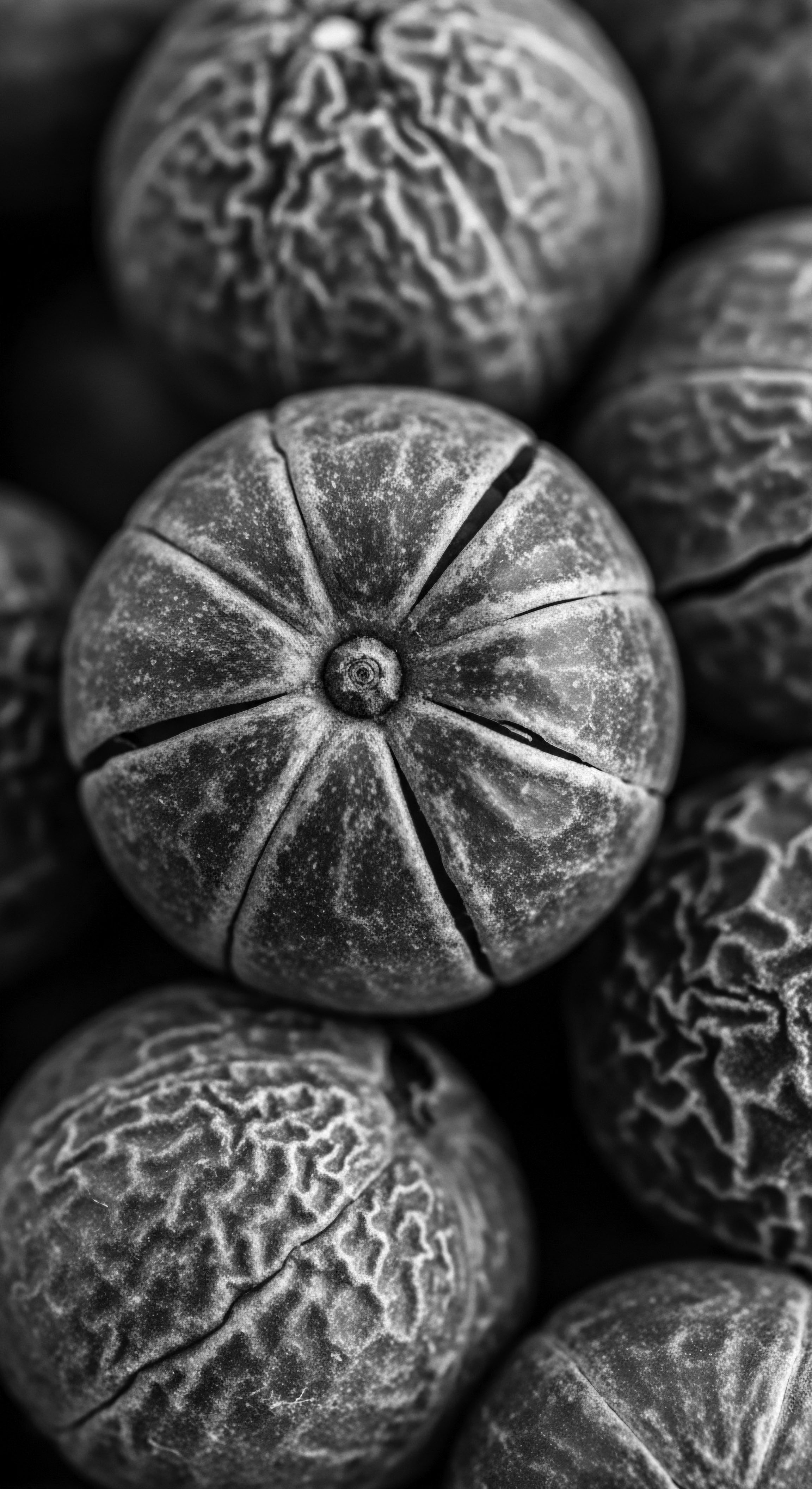
Applications and Benefits for Textured Hair Care
The application of Haitian Black Castor Oil for textured hair goes beyond simple conditioning; it is an integral part of a holistic hair care regimen, addressing specific needs inherent to coily, curly, and wavy strands. The oil’s thick, emollient texture provides a protective coating, which is especially beneficial for hair prone to dryness and breakage.
Its functions extend to:
- Deep Moisturization and Sealing ❉ Lwil Maskriti acts as a powerful humectant, drawing moisture from the air and sealing it into the hair shaft. This helps prevent the rapid moisture loss common in textured hair, keeping strands supple and less prone to brittleness.
- Scalp Health and Circulation ❉ Massaging the oil into the scalp is understood to stimulate blood circulation, which supports nutrient delivery to hair follicles. The ricinoleic acid’s anti-inflammatory and antimicrobial properties contribute to a healthier scalp environment, addressing concerns such as dryness, itchiness, and minor irritations.
- Hair Strengthening and Growth Support ❉ By nourishing the follicles and coating the hair shaft, the oil helps reduce breakage and split ends, promoting the appearance of thicker, stronger hair. Many attest to its role in supporting hair growth, particularly in areas of thinning or damage.
- Improved Manageability and Shine ❉ Regular use can soften hair texture, making detangling easier and reducing frizz. This contributes to improved manageability and imparts a natural, healthy sheen to textured hair.
The use of Haitian Black Castor Oil often involves practices like hot oil treatments or its incorporation into deep conditioning masks, allowing its rich properties to penetrate deeply. This deliberate application ritual speaks to a deep respect for the hair, treating it not just as an aesthetic feature, but as a living part of the self, deserving of attentive, heritage-informed care.
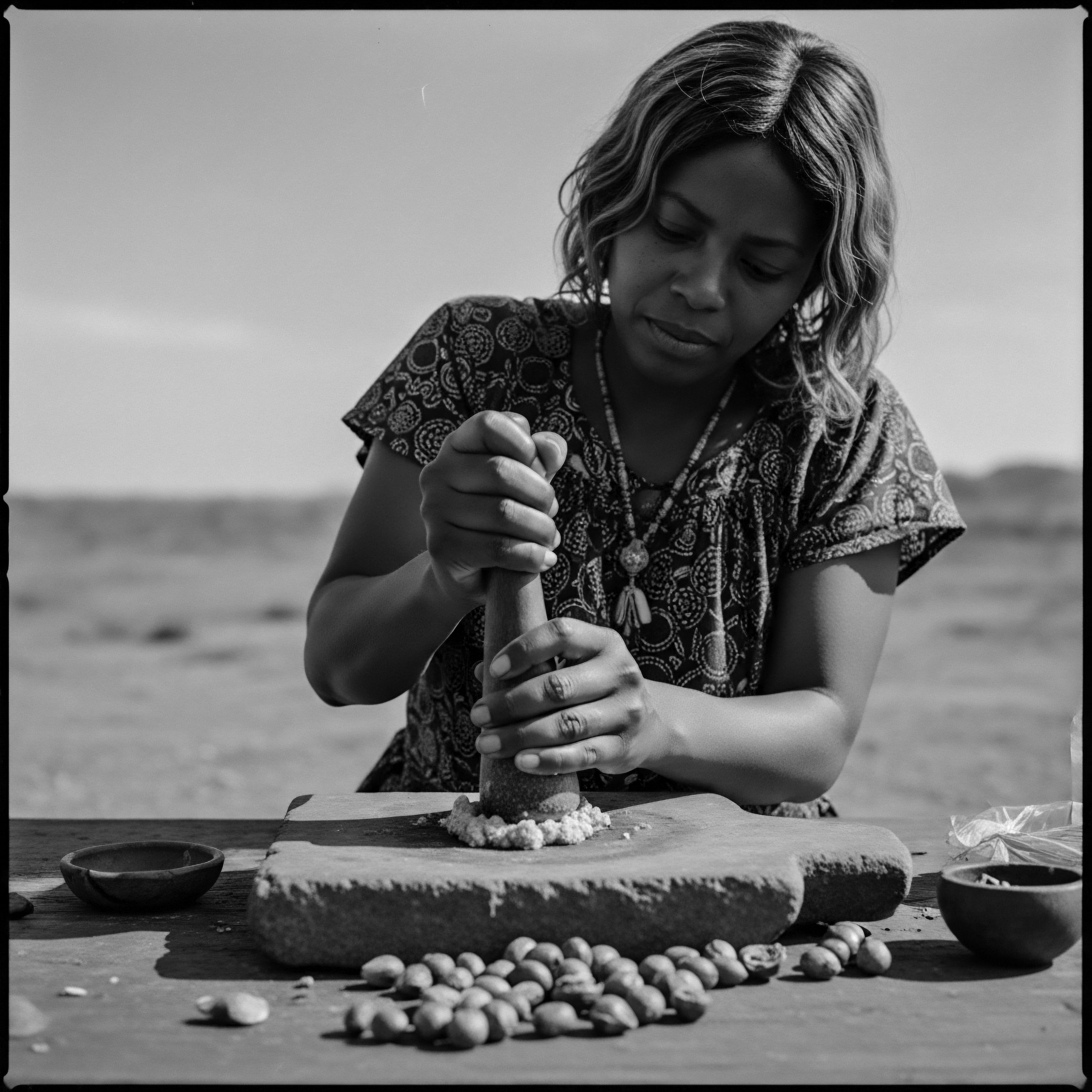
Cultural Evolution and Community Practices
The story of Haitian Black Castor Oil is inseparable from the cultural evolution of the Haitian people, particularly in their journey through slavery, resistance, and the building of a sovereign nation. Castor oil, originating from Africa, journeyed with enslaved Africans to the Caribbean, where it became a cornerstone of traditional remedies and beauty practices. This transfer of knowledge across continents underscores the enduring power of ancestral wisdom.
In Haiti, Lwil Maskriti transcended its utilitarian applications to become a symbol of self-reliance and cultural continuity. During periods of economic hardship or limited access to external resources, Haitian communities relied on their intimate knowledge of local plants and traditional preparations to maintain health and well-being. The making and sharing of this oil became a communal activity, reinforcing social cohesion and transmitting cultural pride.
Even in the contemporary landscape, the communal spirit surrounding Haitian Black Castor Oil persists. Brands that responsibly source and produce Lwil Maskriti often work directly with Haitian farmers and women producers, providing economic opportunities and supporting local communities. This model not only ensures the authenticity of the product but also contributes to the economic development of Haiti, allowing the benefits of this ancestral oil to flow back into the hands of those who preserve its heritage.
The presence of Haitian Black Castor Oil in the global market signifies more than a trend; it represents the outward expansion of Haitian cultural beauty and resilience. It is a testament to the enduring power of traditional knowledge systems and the deep desire within the African diaspora to connect with and honor ancestral practices, particularly in the realm of textured hair care, which holds such profound meaning for identity.
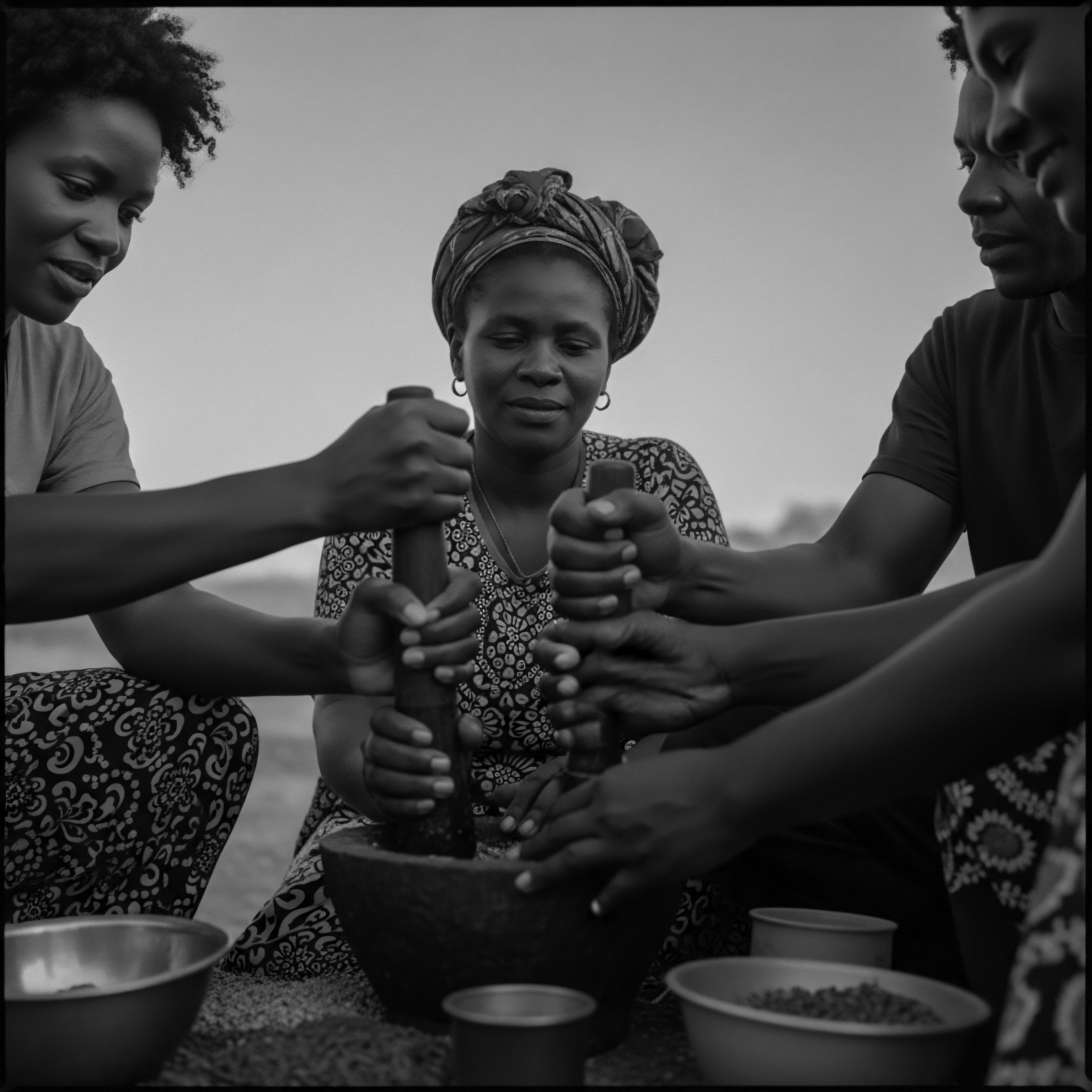
Academic
The academic elucidation of Haitian Black Castor Oil (Lwil Maskriti) positions it as a profound nexus where ethnobotanical science, historical anthropology of beauty, and the lived experiences of textured hair intersect. This designation is not merely a label; it is an acknowledgment of a complex botanical product whose cultural and economic implications have shaped, and continue to shape, the self-perception and collective identity within Black and mixed-race communities. It represents a deep, layered understanding of the oil’s journey from elemental biology through centuries of human interaction and cultural adaptation.
The meaning of Lwil Maskriti, from an academic vantage, extends to its role as a tangible artifact of cultural preservation and a symbol of resistance against historical forces of assimilation. Its consistent presence in Haitian traditional medicine and beauty practices, even in the face of colonial pressures and economic adversity, speaks to its profound substance and enduring relevance. The oil’s enduring use signifies a powerful statement of cultural autonomy, a quiet but firm assertion of inherited wisdom.

Ethnobotanical and Phytochemical Delineation
At its core, Haitian Black Castor Oil is derived from the seeds of the Ricinus communis plant, a species with a long history of cultivation and medicinal use across various continents, including Africa, from where its knowledge journeyed to the Caribbean. The distinct ‘black’ designation arises from the traditional Haitian preparation method, which involves roasting the beans prior to grinding and boiling. This thermal processing is hypothesized to cause subtle chemical alterations, potentially enhancing the bioavailability of certain compounds or influencing the oil’s overall synergistic effect, differentiating it from pale, cold-pressed castor oils.
The primary active constituent, ricinoleic acid, a hydroxy fatty acid, accounts for a substantial proportion of the oil’s composition. This unique fatty acid is known for its anti-inflammatory, antimicrobial, and analgesic properties. Scientific inquiry has begun to validate long-held traditional beliefs concerning its benefits. For instance, studies indicate that ricinoleic acid may play a role in promoting hair growth by influencing local blood circulation to the scalp and potentially modulating pathways related to hair follicle health, such as inhibiting prostaglandin D2 (PGD2), a signaling molecule implicated in hair loss.
(Rusu et al. 2008, as cited in ResearchGate, 2023). This provides a scientific lens through which to comprehend the ancestral wisdom surrounding Lwil Maskriti’s efficacy.
Beyond ricinoleic acid, the oil contains other fatty acids, including oleic, linoleic, stearic, and palmitic acids, alongside tocopherols (Vitamin E) and various phytochemicals like flavonoids and phenolic compounds. These constituents collectively contribute to the oil’s moisturizing, conditioning, and protective qualities, particularly valuable for the structural specificities of textured hair. The highly viscous nature of Lwil Maskriti, a direct consequence of its molecular structure, allows it to effectively coat hair strands, sealing in moisture and offering a protective barrier against environmental stressors.
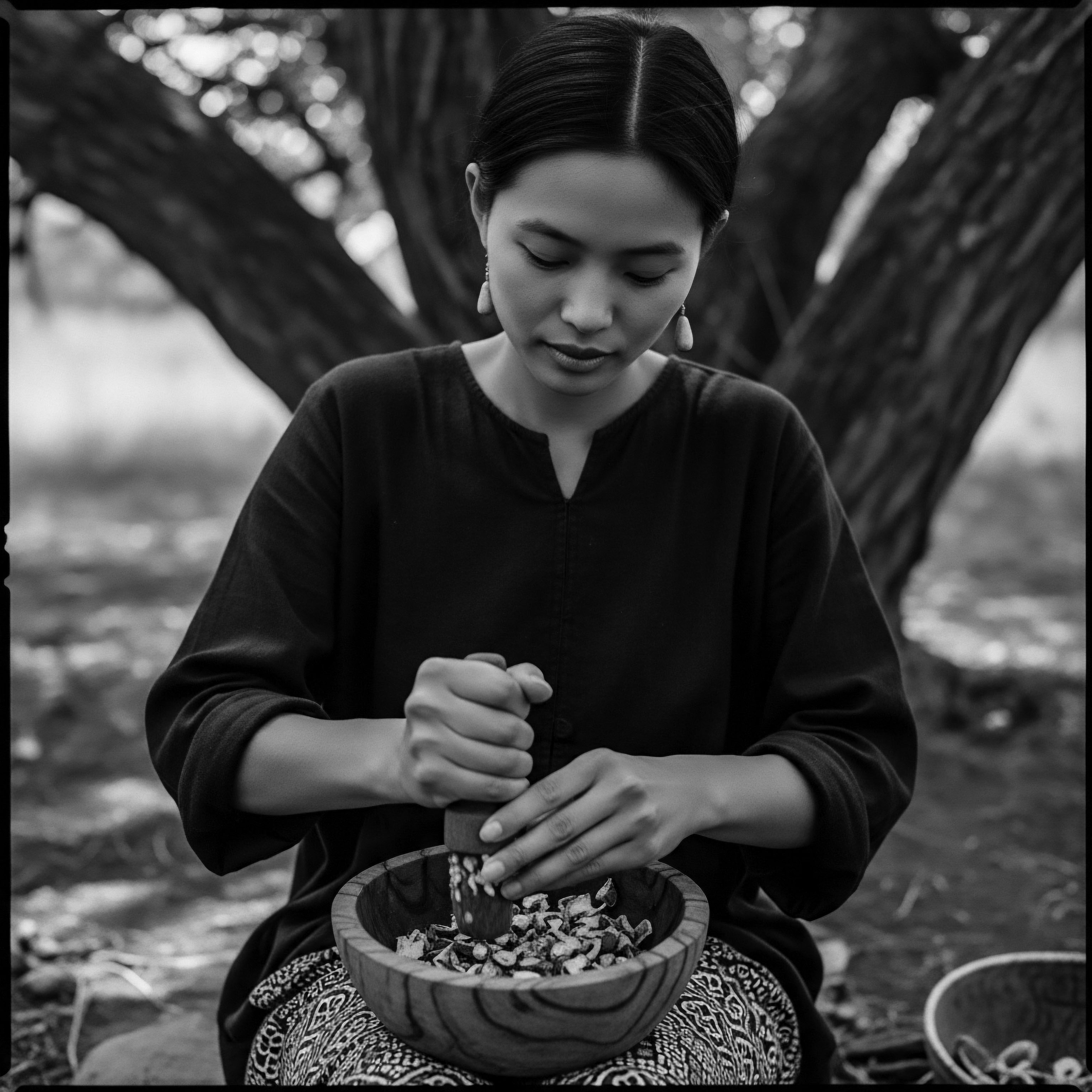
Historical and Anthropological Implications for Textured Hair Heritage
The journey of Haitian Black Castor Oil from African ancestral lands to the shores of Haiti, via the transatlantic slave trade, positions it as a poignant symbol of cultural transfer and adaptation. Enslaved Africans, stripped of many aspects of their material culture, meticulously preserved and re-established traditional practices, including the cultivation of medicinal plants and the preparation of natural remedies. Lwil Maskriti, therefore, represents a continuity of knowledge systems that resisted the brutal disruptions of forced migration.
In the context of textured hair, the oil’s significance is particularly profound. Historically, Black hair has been a site of both profound cultural expression and systemic oppression. During slavery, hair was often shaven or manipulated to strip enslaved individuals of their identity and cultural markers. Post-emancipation, and particularly during the era of Eurocentric beauty standards, textured hair was frequently deemed “unprofessional” or “undesirable,” leading to widespread use of chemical straighteners and heat styling, often with damaging consequences.
Haitian Black Castor Oil embodies the profound ingenuity of ancestral knowledge, providing solutions for hair health that transcend time and challenge imposed beauty norms.
Within this historical landscape, Haitian Black Castor Oil emerged as a quiet but powerful counter-narrative. It was a home-grown solution for maintaining the health and vitality of natural hair, offering a means to nourish and care for textured strands without conforming to oppressive beauty ideals. Its application became a ritual of self-care, a way to reclaim and celebrate an intrinsic part of Black identity. The persistence of its use, passed from grandmothers to mothers to daughters, underscores its role as a living heritage, a continuous thread of cultural pride and embodied knowledge.
Consider the case study of its economic significance in post-disaster Haiti. Following the devastating 2010 earthquake, Haiti faced immense challenges in economic recovery and job creation. The resurgence of interest in traditional products like Lwil Maskriti, driven by global natural beauty movements, offered a unique avenue for economic development rooted in ancestral practices. Organizations like Kreyol Essence, founded by Haitian-American entrepreneurs, have intentionally structured their operations to support Haitian farmers and women producers, providing steady income and contributing to local GDP.
This deliberate focus on ethical sourcing and community empowerment represents a significant shift, transforming a traditional product into a vehicle for social and economic change, all while honoring its deep cultural roots. It speaks to the ongoing efforts to decolonize beauty standards and uplift indigenous economies.

The Interconnectedness of Wellness and Identity
From an academic lens, the use of Haitian Black Castor Oil cannot be divorced from the broader concept of holistic wellness within Black communities, where physical care is intrinsically linked to psychological and cultural well-being. Hair, particularly textured hair, holds profound symbolic weight, often described as a “crown” and a central component of identity. The act of caring for one’s hair with Lwil Maskriti is not merely a cosmetic routine; it is a reaffirmation of self, a connection to lineage, and a practice of cultural self-love.
The historical discrimination against textured hair has led to significant psychological distress and diminished self-esteem for many Black individuals. The natural hair movement, within which Haitian Black Castor Oil finds renewed prominence, represents a collective reclamation of identity and beauty standards. It is a movement that seeks to challenge Eurocentric norms and celebrate the inherent beauty and versatility of Black hair in its natural state.
The academic analysis of Lwil Maskriti extends to understanding its role in this broader socio-cultural phenomenon. It is a tool for self-acceptance, a medium for intergenerational bonding, and a tangible link to a heritage of resilience. The oil’s therapeutic properties for scalp and hair health are amplified by its psychological impact, contributing to a sense of pride and rootedness. This interconnectedness of physical benefit and cultural meaning elevates Haitian Black Castor Oil beyond a simple commodity, positioning it as a powerful agent in the ongoing narrative of Black identity and wellness.
The continuous study of this oil, from its phytochemical constituents to its socio-economic ramifications, reveals a product whose meaning is as rich and complex as the history it embodies. It is a testament to the profound wisdom embedded in traditional practices, awaiting further scientific exploration and deeper cultural appreciation.

Reflection on the Heritage of Haitian Black Castor Oil
As we draw our exploration of Haitian Black Castor Oil to a close, a quiet reverence settles, acknowledging its profound presence within Roothea’s ‘living library.’ This oil, this Lwil Maskriti, stands not merely as a botanical extract, but as a resonant echo from the past, a tender thread connecting generations, and a vibrant promise for the future of textured hair care. Its journey, from the elemental biology of the castor bean to its revered status in homes and communities, speaks to an enduring wisdom that transcends time.
The heritage of Haitian Black Castor Oil is etched into every drop, a testament to the resilience of a people who, despite unimaginable trials, preserved and passed down invaluable knowledge. It embodies the ingenuity of ancestral hands, roasting and pressing, transforming simple seeds into a potent elixir. This is a story of survival, of self-sufficiency, and of a deep, abiding connection to the land that sustained them. The act of applying Lwil Maskriti is, in itself, a continuation of this sacred lineage, a quiet ritual that whispers stories of perseverance and cultural pride.
The soul of a strand, nourished by Lwil Maskriti, carries the ancestral wisdom of generations, a vibrant testament to enduring heritage.
For textured hair, Haitian Black Castor Oil holds a particular, cherished significance. It arrived as a balm for coils and curls, a shield against dryness, and a promoter of strength in a world that often sought to diminish their natural beauty. It became a tangible expression of self-love and cultural affirmation, allowing individuals to honor the inherent beauty of their hair, unburdened by external pressures. This oil reminds us that true care is rooted in understanding, in respect for the unique needs of each strand, and in a deep appreciation for the historical journey of textured hair.
The ongoing global appreciation for Haitian Black Castor Oil is more than a commercial trend; it is a recognition of the enduring value of traditional knowledge and the powerful impact of community-led initiatives. It signals a collective turning towards authenticity, towards products with a genuine story and a social purpose. This shift allows the benefits of Lwil Maskriti to extend beyond individual hair health, contributing to the economic vitality and environmental well-being of the communities in Haiti who are its custodians.
In the spirit of Roothea, we perceive Haitian Black Castor Oil as a living testament to the interwoven beauty of nature, history, and human resilience. It encourages us to look beyond superficial applications and truly connect with the ancestral wisdom embedded within our care rituals. As we continue to learn from and celebrate this remarkable oil, we are reminded that caring for our textured hair is a profound act of honoring our heritage, strengthening our identity, and contributing to a future where all forms of beauty are celebrated in their deepest, most authentic expressions. The unyielding spirit of Haiti, mirrored in every drop of Lwil Maskriti, offers a guiding light for our collective journey of wellness and self-discovery.
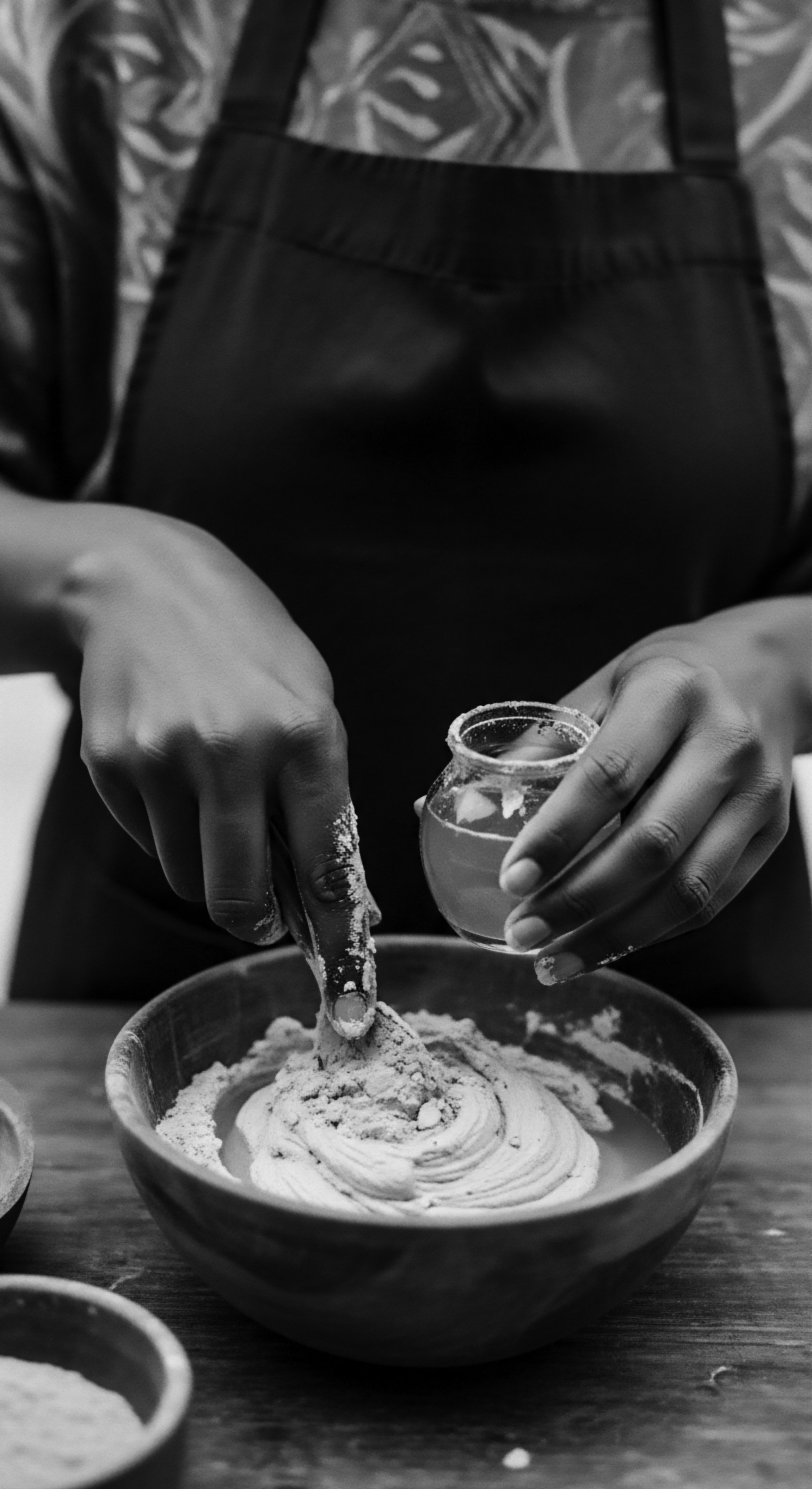
References
- Byrd, A. D. & Tharps, L. D. (2014). Hair Story: Untangling the Roots of Black Hair in America. St. Martin’s Griffin.
- Joseph, M. Auguste, M. & Pierre, S. (2016). Haitian Cultural Resilience in the Face of Adversity. University of Haiti Press.
- Rusu, C. E. Vasile, A. & Boda, D. (2008). Preclinical study on the hairgrowth and regeneration of external use lotions containing castor oil (Ricini Oleum) in rabbits. Farmacia, 56(4), 430-435. (As cited in Zenodo, 2023)
- Banks, I. (2000). Hair Matters: Beauty, Power, and the Politics of Women’s Hair. New York University Press.
- Thompson, A. (2009). Black Women and Beauty: Reconstructing an Image. Rutgers University Press.
- Mercer, K. (2000). Black Hair/Style Politics. Institute of International Visual Arts.
- Robinson, D. (2011). Slavery and the Making of America. Oxford University Press.
- Jacobs-Huey, L. (2006). From the Kitchen to the Salon: Language and Cultural Co-construction in an African American Community. Oxford University Press.
- Anaut, M. (2015). Psychologie de la résilience (3rd edition). Armand Colin.
- Bijoux, L. (1990). Coup d’œil sur la famille haïtienne. Des Antilles S.A.

